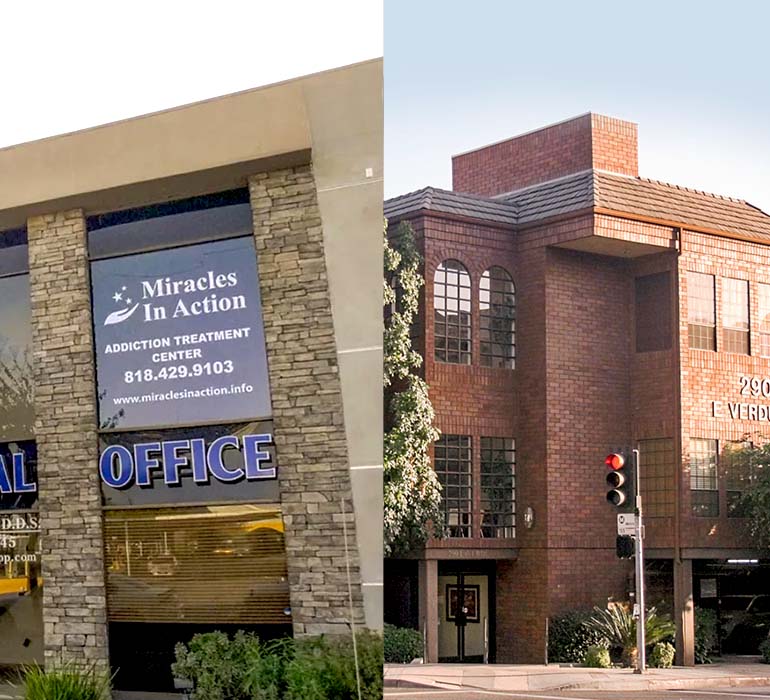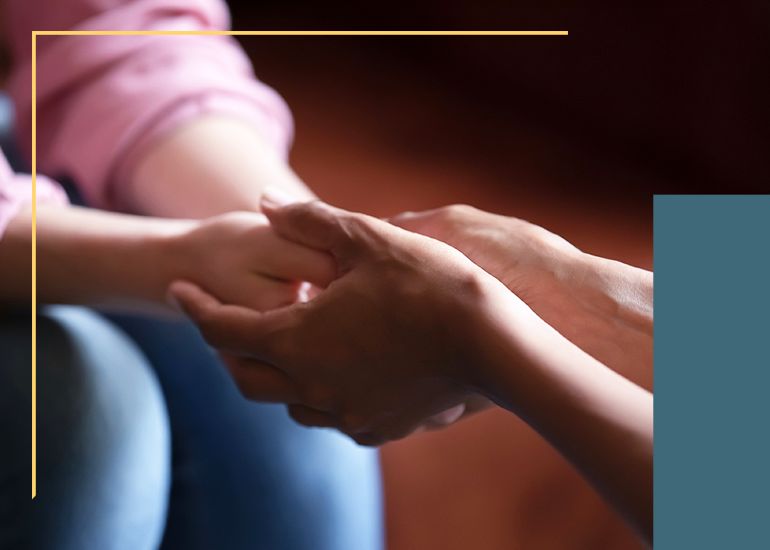Let Us Be Your Partner in Recovery

Northridge Prescription Drug Addiction Treatment
Prescription Drug Abuse, Misuse & Addiction
In the United States, prescription drug misuse and abuse is a widespread problem. Some experts estimate that as many as 18 million Americans—more than 6% of the total population—take prescription drugs for non-medical purposes every year. For many, misuse and abuse can quickly lead to prescription drug addiction.
If you are struggling to control your prescription drug use, or if you suspect that someone you love may be abusing prescription drugs, know that healing is possible. At Miracles in Action, we provide comprehensive prescription drug addiction treatment in Northridge. We offer a safe, stigma-free environment where individuals with all types of drug addictions can receive the one-on-one support they need as they navigate the recovery process. Our compassionate and experienced team utilizes clinically proven treatments and personalized programs, including dual-diagnosis treatment, specifically designed around each individual.
Understanding Prescription Drug Abuse
Because prescription drugs have many medical uses, it can be difficult to tell when someone has begun to misuse or abuse these medications. Generally speaking, prescription drug misuse (or abuse) occurs anytime someone takes a prescription medication in any way other than instructed by a medical professional.
This includes:
- Taking a prescription drug for longer than prescribed
- Taking more than the prescribed dose or more frequent doses
- “Borrowing” or taking someone else’s prescribed medication
- Stealing prescription medications prescribed to someone else
- Taking a prescription drug for the side effects or to get high
- Obtaining multiple prescriptions from different doctors
- Lying to doctors to obtain prescription medications
- Building up a “stockpile” of prescription medications
- Buying prescription drugs from another person or dealer
Many people do not realize that misusing or abusing prescription drugs is extremely dangerous. Even if you were prescribed a medication by your doctor, taking it in any way other than prescribed can lead to increased tolerance, dependency, and, ultimately, addiction. Once an individual has become addicted to a prescription drug, they are likely to experience withdrawal symptoms when not using the drug. At this point, quitting can be extremely difficult without professional treatment.
Get the help you need with Miracles in Action. Call our team today at (818) 287-0080 or contact us online to learn more about our prescription drug rehab, outpatient treatment, and payment plans.
Signs Someone Is Abusing Prescription Drugs
Misusing and abusing prescription drugs can lead to changes in the brain, as well as an array of negative physical, emotional, financial, and interpersonal consequences.
Some of the most common signs that someone may be misusing or abusing prescription drugs include:
- Unusual, unexplained changes in mood or behavior
- Noticeable mood swings
- Increased secretiveness and lying
- Irritability, aggression, agitation, and paranoia
- Stealing or missing medications, money, and other valuables
- Changes in sleeping patterns, including insomnia and excessive sleeping
- Drowsiness and excessive fatigue
- Confusion and memory problems
- Difficulty concentrating
- Slurred speech
- Slowed breathing
- Slowed reflexes and trouble walking, sitting, or standing
- Hyperactivity or very low activity
- Periods of increased excitability followed by depressed mood
- Nervousness and anxiety
- Unexplained changes in weight, including weight gain and weight loss
- Poor judgment and engaging in risky behaviors
- Frequent visits to doctors
- Loss of interest in hobbies, responsibilities, and other activities
- Trouble at school or work
- Frequent, unusual problems with personal relationships
The signs of prescription drug abuse are as varied as the different types of medications that have the potential for misuse, abuse, and addiction. If you notice unusual changes in someone you love, or if you are experiencing any negative physical or mental effects related to your prescription drug use, it could indicate an issue with prescription drug misuse or abuse.
-
What is partial hospitalization (PHP)?Partial Hospitalization, otherwise known as PHP, is a form of treatment that allows individuals struggling with mental health and substance abuse to continue living at home while traveling to treatment (usually 3 to 5 times a week). This outpatient program offers all of the benefits of residential treatment but allows individuals to still reside in the comfort of their homes.
-
Do you offer EMDR therapy in Northridge?
Yes, Miracles in Action offers in-person EMDR (Eye Movement Desensitization and Reprocessing) therapy to help individuals recover from trauma, PTSD, and anxiety-related symptoms.
-
How does drug addiction treatment work?
Addiction affects everyone differently. As such, there is no one-size-fits-all approach when it comes to drug addiction treatment. Instead, the process begins with a personal assessment and evaluation. During this initial meeting, our drug addiction treatment specialists ask a series of questions designed to assess an individual’s level of addiction and recovery needs. Once the assessment is complete, our specialists recommend a personalized treatment program. This program may involve a combination of proven addiction treatments, such as cognitive-behavioral therapy, group therapy, family therapy, stress management, and more. Most often, our patients begin by attending treatment several days a week at one of our facilities. As they progress through recovery, the number of times they need to visit the facility for treatment may gradually decrease.
-
Do you provide DBT therapy for emotional regulation?
Yes, we offer Dialectical Behavior Therapy (DBT), an evidence-based treatment for managing emotional instability, anxiety, and impulsive behaviors.

What Types of Prescription Drugs Are Most Commonly Abused?
Some prescription drugs have a higher potential for misuse and abuse than others. Generally speaking, prescription drugs that produce mild to moderate euphoric effects, reduce pain, and affect neurotransmitters in the brain are more likely to be addictive. This also means they are more likely to be abused.
Some of the most commonly misused and abused prescription drugs include:
- Opioids: Opioids are also known as “painkillers,” and include an array of medications, such as Oxycontin, Percocet, Vicodin, morphine, hydrocodone, and codeine
- Benzodiazepines: Typically used to treat anxiety disorders, seizures, and sleep disorders, benzodiazepines include Xanax, Valium, Klonopin, and Ativan
- Sleep Disorder Medications: Medications used to treat sleep disorders, including insomnia, include Ambien, Lunesta, and certain benzodiazepines
- Stimulants: Various stimulants, including Adderall and Ritalin, are used to treat depression, attention deficit hyperactivity disorder (ADHD), and related conditions
Risk factors for prescription drug abuse include age, mental health, environmental influences, genetic factors, and more. Additionally, the use of multiple medications or substances, including alcohol, can increase the dangers associated with prescription drug misuse and abuse.

How Is Prescription Drug Abuse Treated?
Treatment for prescription drug abuse and addiction is as personal as each person struggling with a substance use disorder. At Miracles in Action, we tailor our prescription drug addiction treatment in Northridge to meet the unique needs of each individual.
Depending on the specific situation, our prescription drug abuse treatment program may include:
- Recommended inpatient detox or certified outpatient detox
- Partial hospitalization programs and/or outpatient programs
- Dual-diagnosis treatment for co-existing mental and behavioral health disorders
- Online intensive outpatient program treatment
- Life skills development, including enhanced stress management
- Ongoing recovery support and aftercare
We combine clinically proven therapies, including cognitive-behavioral therapy (CBT), and cutting-edge addiction treatment programs to help our patients receive the intensive care and continued support they need as they work toward lasting sobriety.
If you are concerned about a loved one or worried that your own prescription drug use has gotten out of hand, we encourage you to reach out to our friendly and professional team today to learn how we can help you or your loved one get started on the road to recovery. We are accredited by the Joint Commission, in-network with MultiPlan, and offer several payment plan options.
-
“Miracles in Action provides a warm, loving, and family feel to the recovery process. I can say that I am very fortunate to have witnessed the miracles that take place here. The management and clients' past and present continue to make this place a success. Thank you Miracles in Action for all that you do. ”
- A.M. -
“Miracles in Action offers stability and recovery. It helps you put your life back together in an environment where people are supportive of one another. I am blessed to bear witness to the miracles that have taken place here. ”
- L.W.

